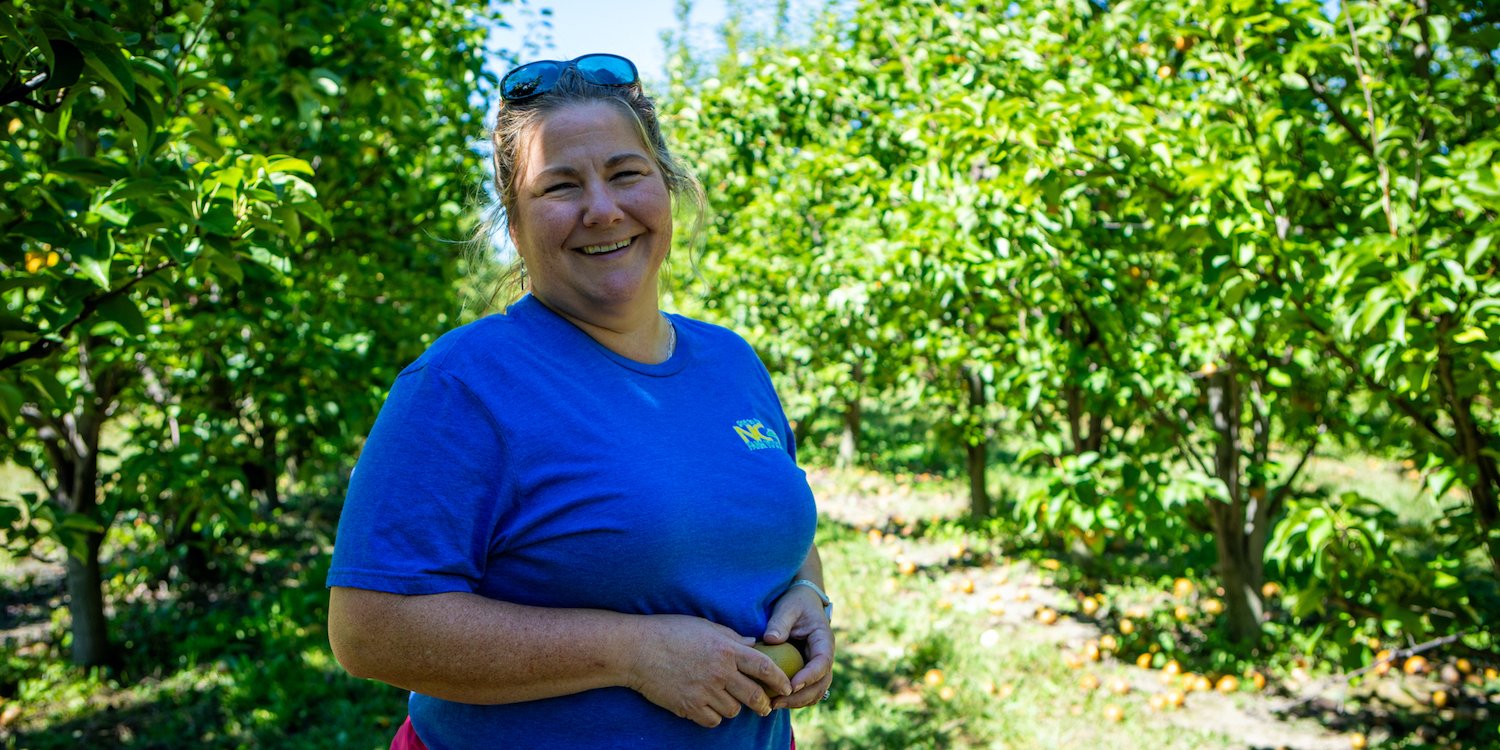Alison Francis is the Director of Nutrition of Haywood County Schools, and has worked with ASAP for many years to source from local farms. In September she volunteered for ASAP’s Farm Tour at Pilot Mountain Pears, which sold Asian pears to Haywood County Schools this year. For our Faces of Local interview this month, we asked her about some of the challenges to getting local food into school cafeterias—and getting kids to eat school food.
Tell us about your role as the Director of Nutrition for Haywood County Schools.
I have been in school nutrition for 24 years. This is my 14th year as director for Haywood County Schools. As director I supervise 15 cafeterias and 87 employees and oversee a budget of $5.2 million. I love working with our local farmers and want the students to have the opportunity to learn about what is grown in North Carolina and where their food comes from when possible.
How do you work with local farmers?
We have been working with KT’s Orchard and Apiary for years to bring local apples to our schools when they are in season. We started purchasing local ground beef from Brasstown Beef last year. We also participate in the North Carolina Department of Agriculture’s Farm to School Program. At the beginning, I just assumed that local produce would be more expensive than what I’m getting from my distributor. That has not been the case. We’re actually getting better prices from local farmers. That’s a huge benefit, in addition to serving local food. The last few years we’ve had extra funds from the USDA to spend only on local food—it’s called the Local Food for Schools grant. That helped us start to buy beef from Brasstown.
What are some of the challenges to serving local food in cafeterias?
The biggest challenge is finding local farmers that are GAP certified. North Carolina wants to have schools use GAP certified farms to make sure sanitation practices are above standard—so we don’t worry about getting students sick from foodborne illness. I don’t know how many GAP certified farms there are, but there certainly aren’t many in Haywood County. Also, the certification is based on each crop, so for a small farmer, it’s very costly if they want to sell schools more than one thing. ASAP has helped to link us with local GAP certified farmers.
It was through Molly [Nicholie] that I first connected with KT [in 2016]. The three of us met and tried to figure out how we could make it work. For one thing, we had to figure out the right size apple to make sure we were getting our half-a-cup requirement for school nutrition. We were used to specifying that we needed 135 apples. KT didn’t do things by count, she measured by the bushel. I had no idea was bushel was! KT found some sort of sorting mechanism to make sure we were getting the right size. KT is dynamo. She will show up here [at our central warehouse] with her apples and completely get them unloaded on the dock, then come ring the doorbell, when we could have helped her. She’s a go-getter.
This year, David [Smiley] connected me with Pilot Mountain Pears. Our kids absolutely love Asian pears. We’ve been getting them for the last few years, but not from Hendersonville. We got 100 cases. I told them if they had more to contact me, but I think they sold everything they had. I loved being there on the farm for the Farm Tour this year! I got to chat with the owner Beth’s mother, who told me they have people coming up from Greenville and Atlanta to pick pears.
Have you seen the food environment in schools change over the years?
Yes, as regulations have become more stringent, we have less students participating in the school nutrition program. I can’t remember what year they started to cut back on sodium levels, but they have continued over the years, and it has really made an impact on the taste of the food. We’ve tried doing different seasonings to add flavor, but everything is really bland and not appealing to kids. Less scratch cooking is done now, but I think many districts are trying to bring that back.
How do your cafeterias serve some of these local products?
With Brasstown Beef, we’re doing baked ziti, tacos. We’re getting ready to pilot some raw beef patties from them. Typically the patties we get from the distributor are pre-cooked. With things like broccoli, squash, and sweet potatoes, which we get through NCDA Farm to School, we roast them in the oven. That seems to hold up and taste the best. Back in the day, if we served broccoli, we had to drown it in cheese sauce, but we don’t do that anymore. Cauliflower was the first thing we tried roasting, and I was shocked how many students ate it. They loved it. Broccoli and cauliflower are favorites now.
ASAP has provided us with great marketing tools to help us showcase the local farmers that we work with. We have posters in the cafeterias with farmer profiles. We put it on menu and share it on our Facebook page.
Can you share a favorite experience with local food in schools?
KT and her husband have come to a couple of schools in the fall and brought several varieties of apples and done taste tests with kids and talked about their orchard. We did a display board where students could put a sticker on which variety they liked the best. Somebody on our staff wore an apple costume. The kids really enjoyed it.

